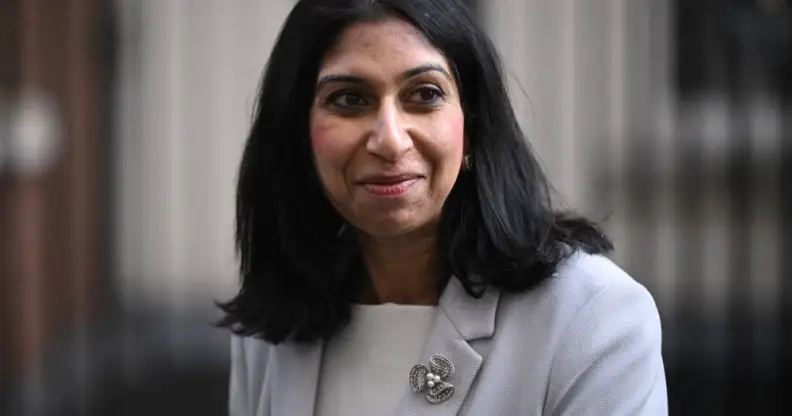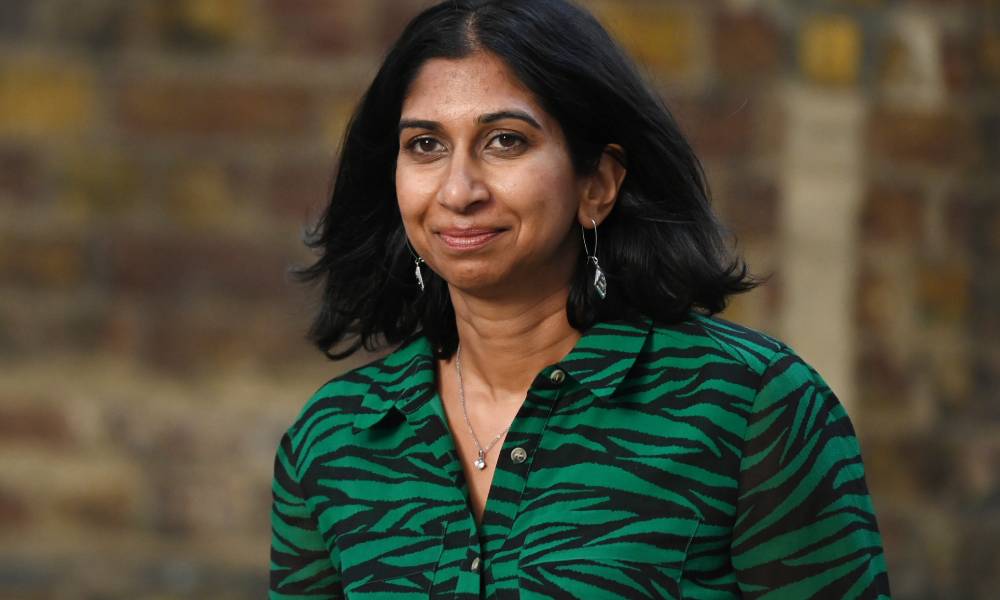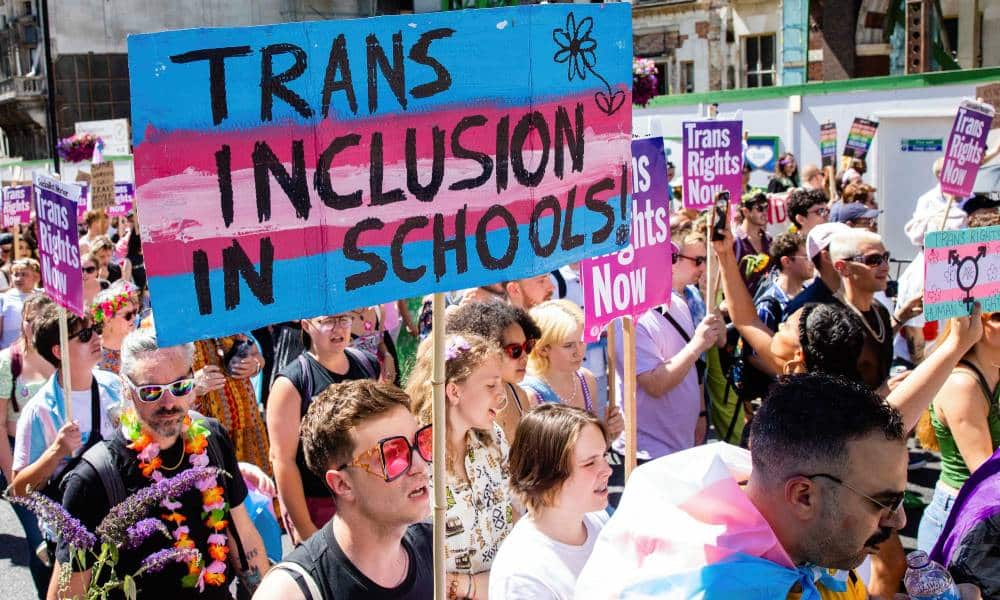Spirit of Section 28 lives on in chilling anti-trans speech by attorney general Suella Braverman

Attorney general Suella Braverman says it is “lawful” for schools to not use a trans kids’ preferred pronouns and name. (Getty/Leon Neal)
Attorney general Suella Braverman said schools should not be teaching kids “keywords” about the LGBTQ+ community or affirm trans identities.
Braverman claimed in a speech before the Policy Exchange thinktank on Wednesday (10 August) that schools could be “indoctrinating children” by allowing them to live as their authentic selves after coming out as trans.
She claimed these “misinformed” schools and teachers are “socially transitioning” kids, using the anti-trans dog-whistle that supportive adults are ‘grooming’ children by affirming their identity.
Braverman added it was, in her opinion, not “age-appropriate” for children to learn about LGBTQ+ identities or information about the queer community from educational facilities.
“In my view, a primary school where they are teaching eight or nine-year-old pupils – year four children – key words such as transgender, pansexual, asexual, gender expression, intersex, genderfluid, gender dysphoria, questioning or queer would be falling foul of government guidance nor is it age-appropriate to teach four-year-olds that people can change sex or gender,” she said.
Her statements reflected the harsh reality that LGBTQ+ people are still under attack despite Section 28 – the reviled legislation banning local authorities and schools from promoting homosexuality – having long been repealed in England and Wales.
The anti-LGBTQ+ measure meant countless queer young people were left in the dark and unable to access vital, potentially life-saving information about their identities – leaving a stain on relationship between the UK government and the LGBTQ+ community.
Elsewhere in her speech, Suella Braverman – the government’s chief legal adviser – claimed there was a “serious risk that the fight for rights undermines democracy”, saying the UK now has a “rights culture”.

Suella Braverman believes the UK has a “rights culture” because people are fighting for trans rights. (Getty/Leon Neal)
She claimed it was legal for single-sex schools to refuse to admit a trans child, adding it was “lawful” for schools to deadname and misgender trans kids as well as deny them access to certain toilets or to participate in some sports activities.
“The problem is that many schools and teachers believe, incorrectly, that they are under an absolute legal obligation to treat children who are gender questioning according to their preference in all ways and all respects – from preferred pronouns to use of facilities and competing in sports,” Braverman said.
The attorney general alleged this is “sometimes” taking place without parents’ knowledge or considering the “impact” affirming a trans child’s identity would have on “other children”.
She provided no evidence to back up these claims.
Suella Braverman continued: “A right not to suffer discrimination on grounds of gender reassignment is not the same thing as a right to access to facilities provided for the opposite sex.”
She described social transition as “not a neutral act” but as a “serious intervention” that should only be done “on the advice of an independent medical practitioner”.
In reality, social transition can be when a person changes their name, pronouns, hairstyle or clothing to align with their gender identity. Social transitioning can be the first step in an individual exploring and affirming who they are.
Recent research found that 94 per cent of trans kids who socially transitioned still identified as trans five years later.
A proportion (3.5 per cent) discovered they identified as non-binary while on their social transition journey while 2.5 per cent in the study ‘retransitioned’ and could be categorised as cisgender.

Research says having access to LGBTQ-affirming educational can have a tremendous and positive impact on queer kids’ mental health. (Mark Kerrison/In Pictures via Getty)
Braverman said supportive teachers who do not deny a trans kid’s identity are leaving themselves open to a “negligence claim for breach of their duty of care” to that child.
She then suggested schools consider each “request for social transition” on a case-by-case basis instead of starting from a place of inclusivity and understanding.
Braverman said any “decision to accept and reinforce” a trans kid’s identity should “only be taken” after a safeguarding process, gaining medical advice, conducting a risk assessment and consulting with parents.
Despite Braverman’s claims, access to affirming homes and schools can have a positive impact on the mental health of LGBTQ+ children.
The Trevor Project – a suicide prevention and crisis intervention charity for queer young people – found, tragically, that nearly half (45 per cent) of LGBTQ+ youth had “seriously considered” suicide in the past year.
This rose to 53 per cent of trans and non-binary youth that responded to the organisation’s annual National Survey on LGBTQ Youth Mental Health survey.
However, LGBTQ+ youth who found their school to be more LGBTQ+ affirming “reported lower rates of attempting suicide”.
About 17 per cent of LGBTQ+ youth who attempted suicide in the past year did not have an affirming school, compared to 13 per cent who did have access to supportive educational spaces.

